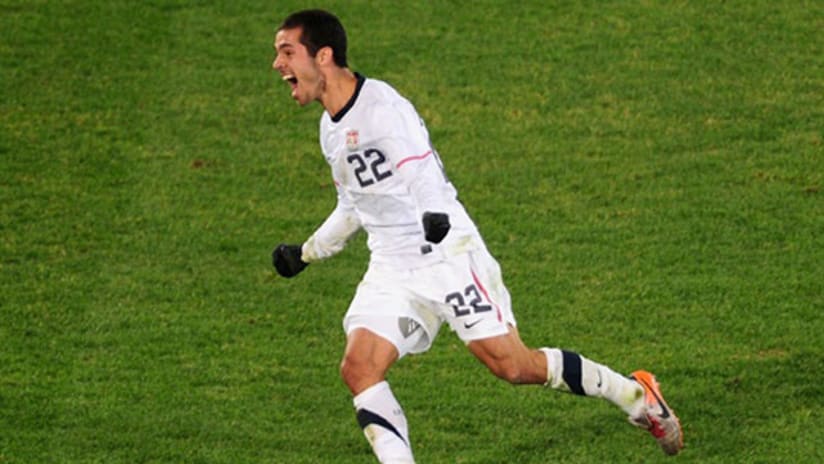Bigger and better. That was the message CONCACAF general secretary Chuck Blazer drove home on Tuesday in discussing this summer's Gold Cup on an hour-long conference call with reporters.
Blazer said he and CONCACAF expect to see as much as a 20 percent increase in attendance over the 2009 tournament (won by Mexico) in large part thanks to a friendlier calendar.
“Back in 2009, some teams weren’t able to bring their best squads because of participation in the Confederations Cup the month before,” Blazer said, referring to the USA. “This time, with everyone bringing their first team and with the chance to go to the Confederations Cup in 2013, we feel that a 20 percent increase in attendance is a reasonable goal.”
Blazer said that certain venues were chosen with attendance in mind. Mexico will open their tournament at Cowboys Stadium in Arlington, Texas, which seats nearly 100,000, while the US and Canada will meet at Ford Field in Detroit, which seats 65,000.
READ: US to meet Canada, Mexico get rough draw for 2011 Gold Cup
“We have high expectations for Ford Field, and with it being as close as we can get to Canada’s largest population center, and of course marketing in and around Detroit itself, there’s every reason we should fill the house,” Blazer explained. “We’d looked in the past at playing games in Canada itself, but logistical issues prevented it.”
The other venues for Group C, which features the USA, Canada, Guadeloupe and Panama, are Raymond James Stadium in Tampa and LIVESTRONG Sporting Park, the new home of MLS’ Sporting Kansas City.
[inline_node:330063]“By the way,” Blazer said, “that game will be the inaugural match for that stadium, it’ll be the first match played.”
Blazer was half-right: The Gold Cup games, scheduled for June 14, will be the first internationals at the new KC stadium, but Sporting will do the honors of opening LIVESTRONG Sporting Park themselves with a date against the Chicago Fire five days earlier on June 9.
Other MLS stadiums to host games will be the Home Depot Center in Carson, Calif., and Red Bull Arena in Harrison, N.J. Both will house group B games, featuring Honduras, Jamaica, Grenada and Guatemala.
In addition to Detroit and Tampa, other non-MLS markets to host games will be Charlotte, N.C., and Miami. Blazer said that this was part of CONCACAF’s plan to make the Gold Cup more accessible to fans and increase the game’s footprint.
“Our objective to bring events to more and more places around the country,” Blazer explained with regard to the venue choices. “All the major key elements were certainly satisfied in the case of Charlotte, and we look forward to that being a great new market for us.”
In a departure from a strictly Gold Cup-line of questioning, Blazer answered queries on how the FIFA executive committee’s decision to keep CONCACAF's World Cup spots at 3.5 would effect the regional qualifying format. Blazer had criticized the executive committee – of which he is a member – in a Twitter post at the time.
“When we were planning [the CONCACAF qualifying format] for [the 2014 World Cup], we did it with an eye toward having four places, ending up with groups of two-and-two coming out of it at the end,” Blazer said of the committee’s decision.
“What this does is add four more dates to our calendar. We’d have to have a playoff to determine third and fourth, and we’d have to have another playoff against another confederation, which we wouldn’t have had to have if we’d have gotten four [automatic qualifiers].”
The result is that CONCACAF will adjust the qualifying procedure for the second time in six months. Blazer said he doesn’t expect a return to the old Hexagonal – “The problem there was that the World Cup was over too fast for too many teams,” he said – but that the new format announced last year was probably a dead issue.
“We’ll have meetings next Monday and Tuesday, and hope to have something to send up to FIFA by the end of next week for approval,” Blazer added.
Another controversial issue Blazer touched on was the decision to have Mexico send what is essentially a reserve team to the Copa América, much as the USA did in South America's championship in 2007. Blazer said this was a function of maintaining the Gold Cup’s primacy in this region as well as helping Mexico qualify for the 2012 Olympics.
“We’d like to see them qualify for 2012, which they didn’t in 2008,” Blazer explained. “And we’re under no obligation to South America to send a full team there. The other alternative was sending no teams, and we think sending what’s essentially an Olympic team with a few overage players was a better solution.”
The Gold Cup is scheduled to kick off on June 5 when Costa Rica take on Cuba at Cowboys Stadium. Presale of tickets for all venues begins on March 9, while general sales start on March 16 at goldcup.org.
<a href="http://www.mlssoccer.com/extratime"><img
src="//chicago-mp7static.mlsdigital.net/mp6/extratime.jpg" alt=""
width="620" height="100" /></a>
Biggest Gold Cup Yet


